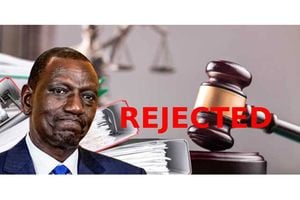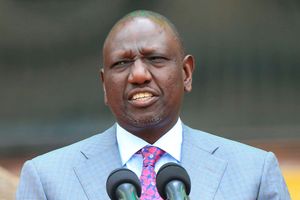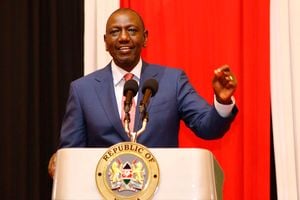
A woman had named President William Ruto in a case involving abductions and destruction of property during the 2024 Gen Z protests.
A judge has struck out President William Ruto from a case involving the abduction of citizens and the destruction of property during demonstrations.
The civil case, which the Attorney-General described as “incoherent”, was filed by Ms Rodah Cheptarus at the High Court in Eldoret in June 2024. This was at the height of youth-led anti-government demonstrations demanding good governance and an end to corruption.
Ms Cheptarus sought various orders, including a declaration that the “President's name, along with the flag and shield of the Republic of Kenya, should be safeguarded and not used for personal interests”.
She moved court to examine the constitutional right to freedom and security of a person, “especially in light of recent acts of violence, destruction and kidnappings that have directly affected the plaintiff”.
She told the court that the resulting unrest had had a profound impact on Kenya.
Ms Cheptarus sued the President and the Attorney-General as first and second respondents, respectively.
But Justice Reuben Nyakundi ruled that the case by Ms Cheptarus intended to lift the veil of immunity of the President from legal proceedings.
He struck out the President’s name following an objection by the Attorney-General stating that the President cannot be sued in person as he has immunity from legal proceedings.
Citing Article 143(2) of the Constitution, the judge said President Ruto enjoys immunity from civil proceedings in any court during his tenure in office.
“It is my view that except in those exceptions allowed under the law, a sitting President cannot ever be made a party to any legal proceedings in court. Any argument that would suggest a possibility of enjoining a sitting President as a party so that orders of judicial review can issue, to say the least, would be quite blind to the provisions of Article 143 of the Constitution,” Justice Nyakundi said in the ruling dated April 2, 2025.
“Under our constitutional architecture of separation of powers, the nature of presidential powers entitles a president while in active service to absolute immunity from criminal prosecution or otherwise civil actions within his or her conclusive and preclusive constitutional authority. There is no immunity for un-official acts.”
The judge stressed that it should be understood that the immunity in Article 143 of the Constitution only lasts for the time the President is in office.
He ordered the case to proceed with Ms Cheptarus pursuing the matter against the Attorney-General as the main defendant.
The judge added that the court could not inquire into what constitutes official or unofficial conduct by the president.
“Given our constitutional structure, courts may not inquire into the President’s motives and intentions. This is to protect the executive office from intrusive inquiry,” said the judge.
Justice Nyakundi added that the President's immunity was intended to prevent an atmosphere of intimidation that would interfere with the performance of his duties.
In the objection, the AG argued that the pleadings were incoherent and failed to state a cause of action. The AG stated that the application was an abuse of process.
Ms Cheptarus had opposed the objection and the removal of the President from the case. She argued that her case was focused on entrenching the doctrine of popular sovereignty and that her case sought to test the "voice of the Kenyan people in the presidency".
“I seek legal intervention to address the challenges affecting the Republic of Kenya. These challenges include ongoing demonstrations, acts of violence and destruction across all 47 counties, which have significantly impacted the nation in 2024,” she said in the response dated December 19, 2024.
She also sought to be compensated “for breach of her life, destruction of important documents, harm to health and malicious damage”.
The petitioner emphasised that Article 20(1) of the Bill of Rights applies to all laws and binds both state organs and individuals to uphold fundamental rights.
In the ruling, Justice Nyakundi said the rationale for official immunity applies where only the personal and private conduct by a president is at issue.









